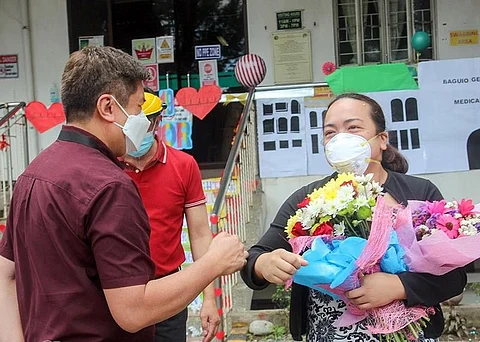

SINCE the start of the pandemic, health workers have put their lives on the line.
Without doctors, nurses, nursing aides, medical assistants and workers in the medical field, the Baguio City will not survive the ongoing global health crisis.
In a tribute to medical frontliners, Baguio Mayor Benjamin Magalong described them as the people's lifeline.
“Without them, we cannot survive this health crisis. It goes without saying that they, too, are putting their own lives on the line for us,” Magalong said.
Turning tables
Bound by an oath with a responsibility to serve the sick, frontliners for the past six months had been battling the virus, but it is another challenge when the tables are turned and medical workers are infected by the virus.
Becoming a Covid-19 patient is not easy and for both frontliners, it was the support of family, friends and colleagues that kept them going.
Working in the medical field was a dream for 33-year-old nurse Jonover David, starting as a volunteer in 2008 and working in the Baguio General Hospital and Medical Center (BGHMC) in 2014 taking care of patients of the Intensive Care and Coronary Care unit.
It all came into a halt on April 15 when he tested positive for Covid-19.
When he found out, his first concern was the people back home and immediately feared for family and colleagues at work whom he may have infected.
“The day I found out I was positive of the virus, I was thinking where I got the virus. I was also thinking I probably infected somebody, number one was my family because they were with me at home and my co-workers that I’m always with at the hospital,” David said.
David’s encounter with the disease caused him pain and struggle, and was alone in isolation for 21 days where only a team periodically checked on him fully equipped with personal protective equipment (PPE).
“With my family, mas naging close kami sa isa’t-isa, mas naging open ako sa kanila, mas wala na iyong dati na ilangan. During the time na naconfine ako sa hospital, doon ko narealize gaano nila kamahal. Kung gaano nila ako binibigyan ng importansya,” David added his experience also paved the way to strengthen his relationship with God.
Kara Saja, 34, who is part of the team for the Infectious Disease Building, was scared when the virus hit the country but banked on her training and preparation to make her strong.
Despite being urged to transfer to another department because she recently gave birth, it did not stop her from taking care of those infected with the virus.
Her work forces her family to practice strict protocol at home, using face masks inside the house and doing constant disinfection.
“Clothes and shoes, slippers used outside stay outside. Washing of hands as well as disinfecting is done vigorously. We were vigilant and were not lax. Every day after my 12 hours of duty, I shower and change to new, clean clothes before going home. Upon arrival, I still remove that same clean clothes and leave it outside, do my routine to disinfect before speaking with anyone. I wear masks even to my sleep,” Saja added, who tested positive for Covid-19 despite precautions.
Both David and Saja heeded the call of the city to reveal their identity to help facilitate contact tracing and are just two of many frontliners in the city fighting.
Baguio contact tracing
Magalong’s appointment as contact tracing czar in the country was lauded by the World Health Organization for the city’s best practice on contact tracing.
One of the important elements in the fight against the virus is the contact tracing efforts coupled with community cooperation to contain the spread of Covid-19 cases.
In the city, once a person tests positive for Covid-19, they are immediately isolated while the contact tracing teams work on direct contacts.
Contact tracing is comprised of the identification of persons who may have direct contact with an infected person and collection of further information on these contacts.
Baguio has 10 contact tracing teams that include police investigators, medical personnel and volunteers. Teams utilize a combination of Geographic Information System as a tool in contact tracing.
At present, there are five triage areas in the city. The Sto. Niño Hospital with a 45-bed capacity and, recently, Teachers Camp with a 90-bed capacity, certified as Temporary Treatment and Monitoring Facility for Covid patients showing mild and moderate symptoms.
Starting last week, an increase in the number of new cases was noted, attributing to more Covid-19 tests conducted in the city for health care workers, bank employees, grocery store workers, vendors, among others.
A week before the city celebrates its 111th city charter anniversary, Baguio recorded close to 300 confirmed cases, with a decrease in active cases following 29 patients who recovered from Covid-19, the highest recovery recorded in one day.
Until the end of the Covid pandemic is seen, medical workers will continue to take risks to care for patients.